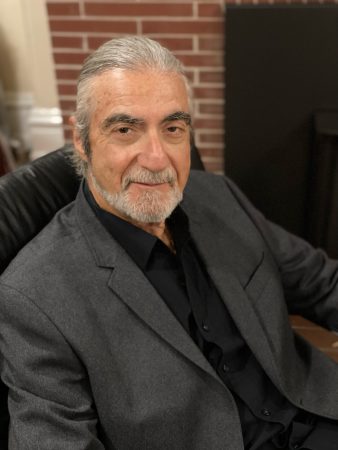Weekend Conference Feb 10-12, 2022 will be held online on our secure Zoom platform. Open to any mental health professional or mental health professional-in-training. Keynote speaker, Ira Brenner, MD.
limited scholarships monies are available, apply now
Program Date(s):
February 10, 2023 - February 12, 2023Weekend Overview
Dissociative Identity Disorder (DID), formerly Multiple Personality Disorder, Multiple Personality, Split Personality, Dual Personality, etc., is arguably the most controversial and difficult to treat mental condition that has ever been recognized. It has never quite found its place in the psychoanalytic world, despite the ironic fact that Anna O., the first psychoanalytic patient, suffered from this condition. Breuer and Freud emphasized her “hysterical” symptoms instead, and thus bypassed the deeper, more complex nature of her malady. In an effort to reconcile this considerable oversight, some contemporary analysts are studying the Dissociative Disorders. Dr. Brenner will discuss the evolution of his thinking, writing, and clinical practice on this subject matter, which spans over 40 years.
The course will use lecture, large group discussion, small group/GAM group discussion, case presentation and discussion and informal discussion to achieve the course objectives.
General weekend schedule:
Friday 9:40am – 6:10 pm US ET
Saturday 9:45am – 6:15pm US ET
Sunday 10:00am – 2:00pm US ET
Detailed schedules, reading lists, and educational objectives will be provided to registered participants
Ira Brenner, MD

Ira Brenner, MD is Clinical Professor of Psychiatry at Sidney Kimmel Medical College of Thomas Jefferson University in Philadelphia, and Training and Supervising Analyst at the Psychoanalytic Center of Philadelphia, where he is Director Emeritus of the Adult Psychotherapy Training Program.
He has a special interest in the area of psychological trauma and chairs the Holocaust Discussion Group and co-chairs the Dissociative Disorders Discussion Group at the meetings of the American Psychoanalytic Association. An internationally recognized speaker, Dr. Brenner has presented at the International Psychotherapy Institute (IPI) where he is Adjunct Supervising Analyst of the International Institute for Psychoanalytic Training (IIPT). He has authored over 100 publications, co-edited three special issues of The International Journal of Applied Psychoanalytic Studies, and has published six books: the latest of which include Injured Men-Trauma, Healing, and the Masculine Self (2009), Dark Matters- Exploring the Realm of Psychic Devastation (2014), and The Handbook of Psychoanalytic Holocaust Studies- International Perspectives (2020). Dr. Brenner has received numerous awards, including: the Gratz Research Prize for his work on the Holocaust, the Piaget Writing Award, the Gradiva Award, the Bruno Lima Award for his work in Disaster Psychiatry (2002), the Presidential Award from the PA Psychiatric Society (2017), the Lifetime Achievement Award from the International Society for the Study of Trauma and Dissociation (2019), and the Hayman Award for Holocaust Studies from the IPA (2017). He also serves as Behavioral Consultant to the San Diego Zoo. He has a private practice of adult and child analysis in the greater Philadelphia area.
Schedule of Presentations
Educational Objectives
After attending this conference, participants should be able to:
Friday February 10, 2023
The Dissociative Character: Introduction to a Different Way of Thinking about the Problem
- Describe a continuum of character pathology in which dissociative and defensive altered states predominate.
- Among patients suffering with severe levels of dissociation, identify three clinical signs that suggest a defensive altered state and deficits in ego integration.
GAM Group
- Describe a continuum of character pathology in which dissociative and defensive altered states predominate.
- Among patients suffering with severe levels of dissociation, identify three clinical signs that suggest a defensive altered state and deficits in ego integration.
Where did baby go? Dissociative Defenses in an infant observation.
- Identify two examples of infant distress and two examples that illustrate the development of primitive defenses in the infant.
- Describe the ways that dissociative defenses protect the infant and child from fragmentation of the self.
GAM Group
- Explain the mechanism by which dissociative defenses protect the patient from fragmentation of the self by applying the concepts discussed by Benjamin Lang, LCSW and Ira Brenner, MD in the presentation of a mother-infant observation
- Apply clinical examples and experiences shared in the small group discussion, to integrate the theory presented in the Infant Observation session with B. Lang and I. Brenner.
Plenary
- Explain three reasons why it is important to recognize and treat patients who utilize dissociation as a defensive operation to ward off overwhelming traumatic experiences within the context of the large group plenary discussion.
- Describe two aspects of the participant’s own learning process that illustrate some of the controversies among analytic therapists/analysts as to the validity of Dissociative Identity Disorder as a diagnostic condition.
Saturday February 11, 2023
Intergenerational Transmission of Trauma
- Name three ways to recognize the intergenerational transmission of trauma and two pathways of transmission from one generation to another.
- Describe two clinical approaches to treat individuals who have experienced intergenerational trauma and two ways to foster resilience in impacted individuals.
GAM Group
- List and explain at least two ways to recognize the intergenerational transmission of trauma and two pathways of transmission from one generation to another.
- Apply clinical examples and experiences shared in the small group discussion, to integrate the theory presented in the session on the intergenerational transmission of trauma.
Clinical Applications of the Model of the Dissociative Character
- Name 3 assumptions about Dissociative Identity Disorder articulated by Dr. Ira Brenner that helps to delineate different levels of dissociation seen among patients who dissociate.
- Describe 5 stages of treatment explicated by Ira Brenner when working with patients who suffer with Dissociative Identity Disorder.
GAM Group
- Apply the clinical example provided by Dr. Ira Brenner, and other clinical examples and experiences shared in the small group discussion, to integrate the theory and technique presented by Dr. Brenner and Dr. Zeitner.
- Explain five stages of treatment explicated by Ira Brenner when working with patients with Dissociative Identity Disorder.
Sunday February 12, 2023
Social Trauma: Devastation and Development of Resilience
- Describe two defenses that operate among therapists and patients alike to shield the mind from the devastating impacts of sociocultural traumas such as the terrorist attacks of Sept 11, 2001
- Explain three major signs of large group regression identified by Volkan
GAM Group:
- Identify three signs of societal regression with traumatic societal events such as September 11, 2001, and similar social traumas occurring in different countries.
- Apply clinical examples and experiences shared in the small group discussion, to integrate the theory presented in the session on Social Trauma and Resilience.
Closing Dialogue:
- Describe three key psychoanalytic concepts that inform the diagnosis and treatment of patients suffering with dissociation
- List two defense mechanisms commonly employed by therapists and patients when confronting massive, sociocultural traumas during and after war or terrorist attacks.
Registration
Registration options:
- Full Conference:
- $497 up to 21 days in advance; $517 thereafter
- *Full members: $359
- *Associate members: $410
- Full time students: $150
- Saturday One Day (morning and afternoon): $150
- Saturday Morning only: $45
*Login to the website with your member information to access your discounted registration rate
Tuition and Fees
See costs above
Limited scholarship funds are available for this training: https://theipi.org/scholarships/
Continuing Education Credit Hours
Weekend Conference:
14.5 CE/CME credits
Saturday One Day:
6 CE/CME credits
Saturday Morning only:
2.5 CE/CME credits
Program Chairs
Anabella Sosa de Brostella, Ph.D.
Lea Setton, Ph.D.
Should you have any questions about the program or the application process, please feel free to contact:
IPI Administrative team - contactus@theipi.org
Membership Benefits
Become a member of IPI at any level and you will have the option of adding on a Zoom Pro account as one of your member benefits. Associate and Full Members also receive discounted registration fees for most of IPI’s events, a subscription to PEP Web, the online psychoanalytic library, and other benefits depending on membership level.
HIPAA compliant Zoom video accounts are an optional add on for all IPI memberships. IPI has a HIPAA Business Associate Agreement with Zoom, which provides a HIPAA compliant platform for our accounts. HIPPA compliance is strongly recommended for all internet-mediated clinical work and clinical teaching. The “+ Zoom Pro” add-on to the IPI membership gives the user the ability to host online meetings with multiple people at the same time. [Current members can upgrade to the “+ Zoom Pro” account and only pay the difference in price from your current membership level.]
Click for IPI Membership and Zoom Account information
Continuing Education Information
This activity has been planned and implemented in accordance with the accreditation requirements and policies of the Accreditation Council for Continuing Medical Education (ACCME) through the joint providership of American Psychoanalytic Association and the International Psychotherapy Institute. The American Psychoanalytic Association is accredited by the ACCME to provide continuing medical education for physicians.
The American Psychoanalytic Association designates this Live Activity for a maximum of 14.5 AMA PRA Category 1 Credit(s)™. Physicians should claim only the credit commensurate with the extent of their participation in the activity.
IMPORTANT DISCLOSURE INFORMATION FOR ALL LEARNERS: None of the planners and presenters of this CME program have any relevant financial relationships to disclose.
The International Psychotherapy Institute, IPI, is approved by The American Psychological Association to sponsor continuing education for psychologists. IPI maintains responsibility for the program and its content. The International Psychotherapy Institute has been approved by NBCC as an Approved Continuing Education Provider, ACEP No. 6017. Programs that do not qualify for NBCC credit are clearly identified. The International Psychotherapy Institute is responsible for all aspects of the programs. The International Psychotherapy Institute is an approved sponsor of the Maryland Board of Social Work Examiners for continuing education credits for licensed social workers in Maryland. The International Psychotherapy Institute is recognized by the New York State Education Department’s State Board for Social Work as an approved provider of continuing education for licensed social workers #SW-0299.
Participants are responsible for verifying that IPI CE credit is accepted by the licensing boards in their own states. Please note: At this time we are aware that CE credit for IPI events will not be accepted by the New Jersey Board of Social Work.



